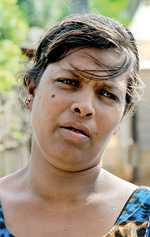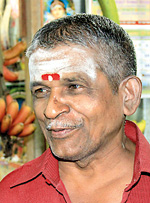News
Lingering sore in a fast-healing Jaffna
View(s):
Chunnakam refugee camp: The small rusty zinc sheet-roofed homes that house 112 families. Pix by Indika Handuwala
It’s a showpiece of human misery and suffering in this northern capital where the ravages of a near three decades of separatist war have almost disappeared.
Nestled amidst lush green tobacco and onion fields in Chunnakam, eight kilometres away from this town, are rows of small houses. Rusty zinc sheets form the roof as well as walls. Some are also made of flattened old tar barrels. For 15 long years this refugee camp has been home for 112 families.
Seven toilets are shared by the more than 400 inmates here, one for every 58 people. “We queue up every morning to use them,” says 30 year-old Jenishwaran Jenita. The daughter of a well to -do fisherman who once owned a trawler, she epitomises the travails of those in this camp. She has been displaced since she was five years old. Now living in the camp, abandoned by her husband, she and her two children depend on her brother, a mason, for their livelihood. State assistance in the form of rations was only available until 2000, she said.

Tales of hardships: Jenishwaran Jenita and Thavagnanam Padma

M. Paramalingam: We have a variety of bananas
The refugees in this camp, like in 37 others dotting this peninsula, are mostly displaced fisher-families from Myliddy – the fishing village now at the centre of a tug of war between Tamil groups and the Government. The land where they lived was taken over to ensure security for aircraft using the Sri Lanka Air Force (SLAF) runway. Since then, a number of other important security installations have come up in this stretch which juts into the sea where there is a fishing pier.
The Government wants to pay compensation to the land owners. In fact it had been agreed to by Prime Minister Ranil Wickremesinghe. However, most Tamil groups insist that compensation will not help. They want the SLAF runway re-located in the Kilinochchi area and argue that was the only way those displaced could resume fishing activity. The debate goes on.
Prolonged life in the refugee camp has spawned a new generation – refugee children. They are at a school meant only for the displaced. For these children education is limited. There is no extracurricular activity including sports. They are blissfully unaware of how other schools function. They told me it was just a case of sitting in a makeshift classroom for a few hours, sometimes learning and other times chatting.
The Chunnakam Refugee Camp has been the cynosure of the Colombo based diplomatic community. So much so, even the UN High Commissioner for Human Rights Zeid Ra’ad Al Hussain was a VIP visitor just weeks ago. He learnt how the camp gets flooded during rains and runs out of water during drought. After the visit Zeid was to declare that lands “which can should be swiftly given back.” He said a “lingering sore will have been cured once and for all.” A military official in the district, however, argued that the “government’s acknowledgement of humanitarian concerns have led to the release of large extents. Among those remaining include those that could affect national security considerations.” He spoke on grounds of anonymity since they are not authorised to speak to the media.
Jenita said the displaced were allowed to visit their original homesteads for the first time in December last year. “President Maithripala Sirisena promised during a visit that our lands will be returned. We hope he will keep to his promise,” she declared.
Also driven to poverty is 60 year-old Thavagnanam Padma. She lived near the Myliddy fisheries pier and her husband led a labour force of 60 persons. He carried out contract work for fishing vessels. “Our only source of income now is my 30 year-old daughter who works as a labourer. She earns Rs. 400 a day and eight members in our family eke out a measly existence,” she said. This, she said, meant having to be frugal on food with no money for any other activity. She lamented that foreign visitors come, “see our plight and assure that help would arrive. We have waited so long but nothing has happened.”
 N. Nagendraseelan, a retired teacher who is Secretary of the Valikamam North Resettlement and Rehabilitation Committee (which covers Myliddy) said “The persons living in this camp face hardships daily. They do not have enough money for food. The Government no longer provides them free rations. Their main livelihood has been the fisheries industry and today they live in camps closer to agricultural areas. The conditions are worse in some of the camps. They sleep in open areas as they do not have space inside.”
N. Nagendraseelan, a retired teacher who is Secretary of the Valikamam North Resettlement and Rehabilitation Committee (which covers Myliddy) said “The persons living in this camp face hardships daily. They do not have enough money for food. The Government no longer provides them free rations. Their main livelihood has been the fisheries industry and today they live in camps closer to agricultural areas. The conditions are worse in some of the camps. They sleep in open areas as they do not have space inside.”
Added Mr Nagendraseelan “There are some who have been born in refugee camps and now living as adults. Children do not have a place to move around, leave alone space to play.”
Outside the refugee camps, it is a different story. Agriculture is booming. “It is a good time for vegetable cultivators,” said Sivakanthan Sinniah, a vegetable dealer in Tirunelveli. He said whilst some of the produce is sold in the peninsula, the balance is transported to the wholesale market in Dambulla. He said the harvest of spring onions in particular has been “very good.” Most farmers, he added, were going for this crop which takes only three and a half months to grow. The onions fetched anything between Rs. 40 to Rs. 60 a kilo as against Rs 100 in Colombo.”There is also a great demand for bananas,” says farmer M. Paramalingam in Tirunelveli. He said traders from other parts of the country were now coming in lorries to purchase them. He added that they have a variety of bananas to offer them.
The agricultural boom here has a flip side. Most of the produce still do not reach Colombo, a move which could lower prices and provide consumers with better quality. The railway is yet to gear itself to introducing more goods trains to move stocks. “Over 1,200 passengers pass through the Jaffna Railway Station a day. Four trains each from Kankesanthurai to the South and vice versa operate through this station,” Station Master Pradeepan said. Trains have become the most popular mode of transport for travellers from the south.
For a fast developing Jaffna, the sore point still remains the refugee camps and the untold hardships their inmates undergo. They need the Government’s priority attention. Then the visits of diplomats will no longer be to see the horrible conditions in the camps but how much this peninsula has progressed.
| National Anthem: Tamil version not new to Jaffna Well before sections raised issue over the singing of the National Anthem in Tamil, the Tamil version was being played in state institutions, including the District Secretariat, in Jaffna. The anthem continues to be played in Tamil, but has raised issues whether it should be played in both languages as all state institutions in Sri Lanka consists of all communities. J. Dadallage, Secretary to the Public Administration and Management Ministry, told the Sunday Times that there have been no circulars issued instructing on what language the national anthem should be sung. “We have allowed both languages irrespective of the ethnic composition of the district.” Currently Sinhala and Tamil versions of the anthem are being sung in many government departments. In some offices the recorded tune is played giving the liberty to the staff to sing the anthem in their mother tongue. |
High Court Judge gives Uni students a lesson on law and order Increasing incidents of gang fights, clashes among youth and cases of public harassment have prompted a judge in Jaffna to request students to comply with the laws both within the university premises and without to ensure a better society. Increasing incidents of gang fights, clashes among youth and cases of public harassment have prompted a judge in Jaffna to request students to comply with the laws both within the university premises and without to ensure a better society. “Today in Jaffna, there are incidents of gang fights, child abuse, public harassment cases and violent activities being reported. If any issues erupt, don’t turn to violent protests. We don’t like to see university students languishing in cells. “You are our future leaders Jaffna High Court Judge M. Elancheleyan said at an event to mark the aluminum jubilee of the Department of Law, University of Jaffna last Sunday at the Kailasapathy Auditorium. He said priority should be given to eliminate social injustices and crimes.The Judge said while giving verdicts for cases which have dragged on for years the courts should pay attention to social injustice too. “The society should be protected first at any cost,” he said. “Now, with the help of my fellow magistrates in the district, the distribution of Kerala cannabis in the city has been put an end to,” he said. ”If any of you graduates are found guilty or convicted by a court you would not be able to join the government service, that’s why our magistrates and lawyers are trying to settle the cases,” he said. Pointing out that now ragging inside the universality premises is an offence, the High Court Judge said the students should maintain law and order. “When we were students it was not an offence, so we did it, but not now.” |
| Constitutional Reforms committee wants more time in Jaffna The Public Representations Committee on Constitutional Reforms plans to return to Jaffna for a second time due to a large number of requests, a senior official said. The committee conducted two days of sittings in Jaffna on February 15 and 16. Issues concerning resettlement, lands, rights of disabled persons, womens’ rights were among the subjects on which representations were made. Committee chairman Lal Wijenayake told the Sunday Times though the committee has concluded its public sittings in all the districts, it has decided to hold sittings again in Jaffna considering the requests made for further submissions. ” We could not hear all the cases in two days,” he added. Earlier this month at least 158 persons appeared before the committee submitting their oral and written submissions to the committee. Five political parties, trade unions, and a number of womens organisations put forward their proposals. ” We were surprised to hear some of the original ideas from the people. A group advocating for the rights of the disabled people argued it should be included into the Fundamental Rights with other amendments,” he said. ”Everyone needs long lasting peace with national reconciliation. There were different views from people in the north and south on how we are going to achieve that,” Mr Wijenayake said. He said the views of the victims of the three decade-long war should be included in the new constitution- making process although the war ended seven years ago. People were very keen to make submissions, some that didn’t even come under their purview. “Land issues, disappearances, caste issues were all brought to our attention,” he said. |

